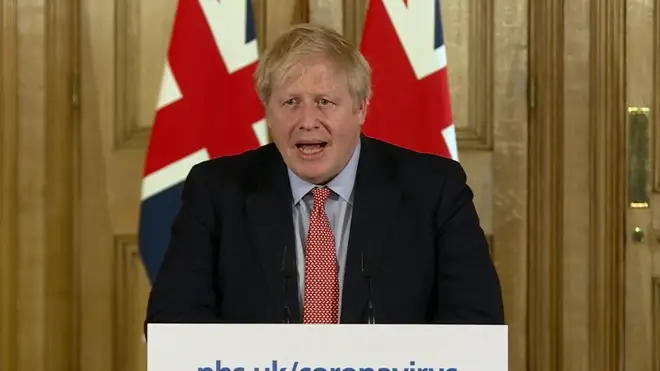
Tom Swarbrick 4pm - 6pm
12 March 2020, 19:53

The UK's coronavirus response plan has moved into the "delay" stage after it proved impossible to contain the spread of COVID-19.
Boris Johnson has introduced a series of measures to tackle coronavirus in a statement after chairing an emergency Cobra meeting onThursday.
The prime minister introduced a series of measures to "minimise suffering" from the escalation of the outbreak.
These include:
- Stay at home for seven days if you have any symptoms consistent with coronavirus
- Over 70s with serious medical conditions should not go on cruise trips
- Children should not go on international school trips
The prime minister also confirmed schools would remain open and large scale events would go ahead.
Referring specifically to school closures, he said: "The scientific advice is that this could do more harm than good at this time but of course we are keeping this under review."
Chief medical officer Chris Whitty later expanded on the this decision which he said was due to research indicating that children are less affected by the virus.
But, the prime minister added: "Many more families are going to lose loved ones before their time" as the UK battles with "the worst public health crisis of a generation."
He then rejected any comparisons made between COVID-19 and the seasonal flu, saying the former was "more dangerous" due to a lack of immunity.
The measures are likely to expand in the next few weeks, Mr Johnson added, which could include isolating entire households should one person exhibit symptoms.
It could also include social distancing from the vulnerable population and the elderly - the group who are most at risk from the virus.
He said: "I want to signal now that this is coming down the track."
READ MORE: Latest updates on coronavirus LIVE
The delay strategy seeks to slow down transmission of COVID-19 between people in order to reduce the amount of pressure already being placed on the NHS, and to buy more time to find a vaccination.
Delaying the virus spread could also push the peak of cases into summer months, when viruses are often less contagious and the NHS is under less pressure.
According to the government's plan, the "social costs" that would need to be enforced to delay the spread could include urging people to work from home, shutting schools and cancelling large events or gatherings.
"Some of these will have social costs where the benefit of doing them to delay the peak will need to be considered against the social impact," the action plan said.
It comes after the World Health Organisation upgraded the status of the illness to a pandemic on Wednesday.
This declaration signals the global spread of a new and contagious disease.
The UK has so far recorded 590 cases of the virus with ten deaths, however the number of cases not yet identified is expected to be much higher.
Sir Patrick Vallance, the chief scientific adviser, said the UK could have between 5,000 and 10,000 infected at this current time.
He said this estimation was based on the calculation of the disease trajectory that showed the UK is four weeks behind Italy and other countries in Europe.
"This is still a relatively small number," he added.
Globally, more than 127,000 people have tested positive, while more than 4,700 people have lost their lives.
The majority of cases and deaths have been recorded in China, with Italy and Iran being the second and third worst-hit countries respectively.
This story is being updated